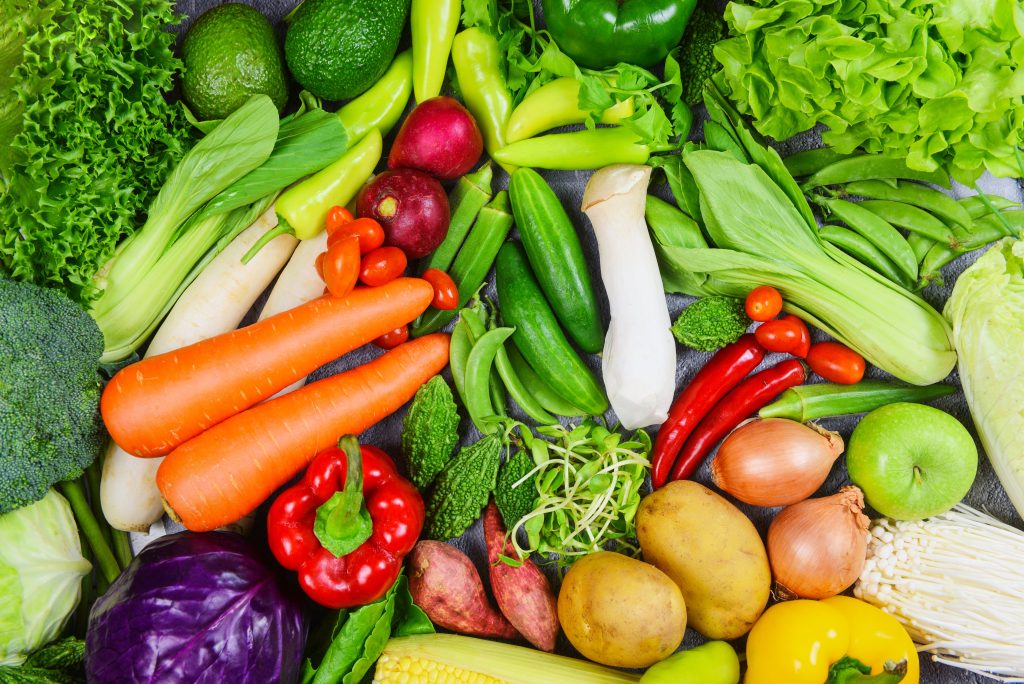Just One Thing!
All of us have weaknesses for certain foods. Some of us crave sweet things such as chocolate, cookies and ice cream. Others crave savory foods like potato chips, pizza and just plain old bread. Everyone knows these foods are “unhealthy” and yet most of us continue to give in to these cravings just the same. What if I were to tell you that you could continue to eat the things that you crave and love AND be much healthier at the same time. Recent research has found that you can. You do need to make a change, BUT unlike the fad diets and starvation techniques of the past, instead of taking away the foods you love, you simply make one small change, add one thing… VEGETABLES,VEGETABLES and more
VEGETABLES!
Research has shown that adding vegetables to your diet, particularly raw leafy greens and eating lots of those vegetables before the “unhealthy” foods has a profound impact on your overall health. We all know that vegetables are high in nutrients. We also know that if you eat a lot of vegetables you will probably eat less of other foods, but something much more important has recently been discovered. Vegetables can make the rest of your meal healthier by slowing down the digestion rate of the entire meal and therefore significantly increasing your metabolic rate. A faster metabolic rate reduces body weight, body fat, and waist circumference significantly in both the short and long term. Digestion rate is how quickly foods break down in your stomach and intestines. Metabolic rate is the amount of calories you burn throughout the day while at rest. The simple act of slowing down the digestion rate of our meals allows our calories to enter the bloodstream more slowly, giving our lean tissues more time to absorb and use those calories. When our lean tissues absorb and use more calories, fewer calories go to fat, we burn more calories throughout the day, and our metabolic rate is higher. This also means our brain and body are more active, so we think and move with more energy and we become leaner. Protein, fiber, and dietary fats also slow digestion to provide some benefits, but not nearly as much as vegetables do.
On to the research…
In 2011 it was shown that eating vegetables before other carbs leads to dramatically better metabolism (insulin sensitivity) in type 2 diabetics at 6, 12, 18 and 24 months compared to “healthy eating” (a food exchange system which is the standard of care for diabetics) [1]. This is not to say that eating vegetables along with junk food is better than eating vegetables without the the junk. Changing more things has the potential for greater benefits, but that might become overwhelming and therefore lead to less benefit. Change is generally easiest if it is done one step at a time, and if only one step is actually ever needed for the effect you are after, even better.
In 2012 it was shown that it takes about 200 grams of vegetables (8 oz, which is 3 cups of lightly cooked veggies or double that in leafy greens) to significantly raise metabolic rate in diabetics [2]. If the vegetables were green then there was also a drop in body weight, body fat, and waist circumference. The more vegetables are cooked, the softer they become and the impact on metabolic rate diminishes.
In 2013 it was shown that having the vegetables 10 min before the carb resulted in dramatically slower meal digestion than when the vegetables were eaten 10 min after the carb [3]. This means having a lot of vegetables won’t help you slow digestion very much if you have already digested much of your meal before you eat them. Presumably eating vegetables together WITH the rest of your meal would be as helpful as eating them right before the meal, since either way the vegetables are in your stomach with the rest of the food, but this has not yet been tested.
Although adding a lot of vegetables to your diet might be challenging for a variety of reasons, it can be incredibly comforting to know that you can keep eating all the things you love and actually make physiological, medical, and quality of life headway without ever going on a diet. In fact, the effects are profoundly stronger than if you had gone on a diet. The only thing you have to focus on, and make sure it happens every day, is vegetables.
1. “A simple meal plan of ‘eating vegetables before carbohydrate’ was more effective for achieving glycemic control than an exchange-based meal plan in Japanese patients with type 2 diabetes” by S Imai et al., Asia Pac J Clin Nutr 20 2011 161
2. “Effects of total and green vegetable intakes on glycated hemoglobin A1c and triglycerides in elderly patients with type 2 diabetes mellitus” by K Takahashi et al., Geriatr Gerontol 12 2012 50
3. “Eating vegetables before carbohydrates improves postprandial glucose excursions” by S Imai et al., Diabet Med 30 2013 370
4. “Postchallenge Glucose, A1C, and Fasting Glucose as Predictors of Type 2 Diabetes and Cardiovascular Disease” by H Cederberg et al., Diabetes Care 33 2010 2077

